Related Research Articles
At the 1904 Summer Olympics, seven wrestling events were contested, all in the freestyle discipline. Then-known as catch wrestling, it was the first time freestyle wrestling was featured, as the first Olympic wrestling contests had been in the Greco-Roman style. Weight classes also made their first appearance. The sport continues to be in the Olympic program to the present day.
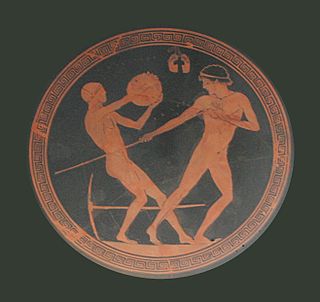
A pentathlon is a contest featuring five events. The name is derived from Greek: combining the words pente (five) and -athlon (competition). The first pentathlon was documented in Ancient Greece and was part of the Ancient Olympic Games. Five events were contested over one day for the Ancient Olympic pentathlon, starting with the long jump, javelin throwing, and discus throwing, followed by the stadion and wrestling. Pentathletes were considered to be among the most skilled athletes, and their training was often part of military service—each of the five events in the pentathlon was thought to be useful in war or battle.
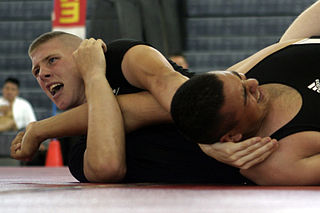
Submission wrestling, also known as submission grappling, submission fighting or simply grappling, is a competitive martial art and combat sport that focuses on ground fighting and submission techniques. It is a hybrid discipline that incorporates elements of various grappling arts such as various wrestling styles, judo, and Brazilian jiu-jitsu. Submission wrestling is practiced both as a competitive sport and as a training method for self-defence and mixed martial arts (MMA).

Wrestling is a martial art and combat sport that involves grappling with an opponent and striving to obtain a position of advantage through different throws or techniques, within a given ruleset. Wrestling involves different grappling-type techniques such as clinch fighting, throws and takedowns, joint locks, pins, and other grappling holds. Many different wrestling techniques have been incorporated into martial arts, combat sports, and military systems. Wrestling is genuine competition; professional wrestling is athletic theatre.

Greco-Roman, Graeco-Roman, classic wrestling is a style of wrestling that is practiced worldwide. Greco-Roman wrestling was included in the first modern Olympic Games in 1896 and has been in every edition of the summer Olympics held since 1904. This style of wrestling forbids holds below the waist, which is the main feature that differentiates it from freestyle wrestling. This restriction results in an emphasis on throws, because a wrestler cannot use trips to bring an opponent to the ground or hook/grab the opponent's leg to avoid being thrown.

Amateur wrestling is a variant of wrestling practiced at Olympic, collegiate, scholastic, or other amateur level competitions. There are two international wrestling styles performed at the Olympic Games: freestyle and Greco-Roman. Both styles are under the supervision of the United World Wrestling (UWW).

Freestyle wrestling is a style of wrestling. Along with Greco-Roman, it is one of the two styles of wrestling contested in the Olympic Games. High school wrestling and men's collegiate wrestling in the United States are conducted under different rules and termed scholastic and collegiate wrestling. U.S. collegiate women's wrestling is conducted under freestyle rules.
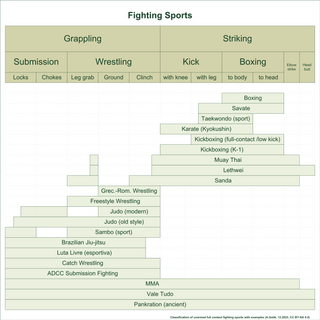
A combat sport, or fighting sport, is a contact sport that usually involves one-on-one combat. In many combat sports, a contestant wins by scoring more points than the opponent, submitting the opponent with a hold, disabling the opponent, or attacking the opponent in a specific or designated technique. Combat sports share a long history with the martial arts.
Real Pro Wrestling was a professional sports league of wrestling, similar to the amateur wrestling found in the Olympic Games and at the college and high school level. The term "real" was meant to emphasize that it was professional and it was wrestling, but that it was not professional wrestling in the traditional sense; modern professional wrestling features predetermined outcomes and operates under a very different set of rules from amateur wrestling.
James "Chico" Hernandez is an American martial artist who competes in the sport of Sambo. He was the first Sambo champion to be featured on a box of Wheaties Energy Crunch and CNN/SI "Faces In the Crowd".
Cole Konrad is an American retired mixed martial arts fighter. Konrad won a gold medal at the 2005 Pan-American Championships. He won the NCAA wrestling championships in 2006 and 2007 at 285 pounds and finished third at the 2006 World University Championships at 120 kilograms. He was the first Bellator Heavyweight World Champion.

United World Wrestling (UWW) is the international governing body for the sport of amateur wrestling; its duties include overseeing wrestling at the World Championships and Olympics. It presides over international competitions for various forms of wrestling, including Greco-Roman, Freestyle, Grappling, and others. The flagship event of UWW is the World Wrestling Championships.

The United States competed at the 1920 Summer Olympics in Antwerp, Belgium. 288 competitors, 274 men and 14 women, took part in 113 events in 18 sports.
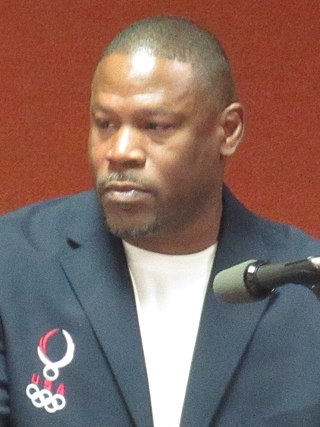
Kevin Andre Jackson is an American retired freestyle and folkstyle wrestler, and mixed martial artist. Following his competitive career, Jackson would become a wrestling coach.

The history of collegiate wrestling can be traced to the many indigenous styles of folk wrestling found in Europe, particularly in Great Britain. Those folk wrestling styles soon gained popularity in what would become the United States, and by the mid-to-late 19th century those styles, especially freestyle wrestling, emerged in gymnasiums and athletic clubs throughout the country. From then on, tournaments were sponsored and a professional circuit of wrestlers helped promote wrestling in the United States and throughout the world.
Michael Najeeb Zadick is an American former folkstyle and freestyle wrestler. He competed in the Men's freestyle 60 kg division at the 2008 Summer Olympics. He lost in the 1/8 finals to Vasyl Fedoryshyn.

Wrestling and grappling sports have a long and complicated history, stretching into prehistoric times. Many traditional forms survive, grouped under the term folk wrestling. More formal systems have been codified in various forms of martial arts worldwide, where grappling techniques form a significant subset of unarmed fighting.
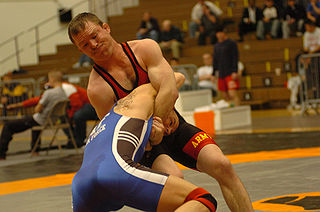
The different styles of wrestling may be classified in various ways, such as:
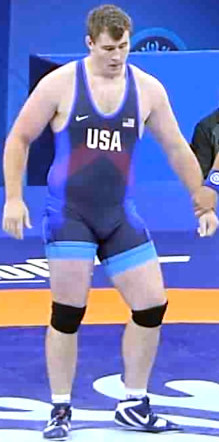
Adam Jacob Coon is an American heavyweight wrestler and professional football player, playing offensive guard for the Seattle Sea Dragons of the XFL, notable for not having played football in college. Before pro football, Coon was an accomplished wrestler at the state, national, and international levels. He was a 2011 Cadet World freestyle gold medalist, 2014 Junior World double bronze medalist in both Greco-Roman and freestyle, two-time NCAA Division I finalist, 2018 Senior World silver medalist in Greco-Roman, and a Pan American gold medalist in 2019 and silver medalist in 2020.

Gable Dan Steveson is an American professional wrestler, freestyle wrestler and folkstyle wrestler who is currently signed to WWE and is performing on the NXT brand.
References
- ↑ Grasso, John (6 March 2014). Historical Dictionary of Wrestling. Scarecrow Press. ISBN 9780810879263 . Retrieved 11 March 2019– via Google Books.
- 1 2 3 García, Justin D. (2022), "Wrestling", Salem Press Encyclopedia, Salem Press, retrieved 2022-12-04
- 1 2 Bullard, Eric (2017), "Freestyle wrestling", Salem Press Encyclopedia, Salem Press, retrieved 2022-12-04
- ↑ "Team USA". Team USA. Archived from the original on July 31, 2013. Retrieved 2019-03-26.
- ↑ Nash, John S. (13 August 2012). "The Olympic History of Catch Wrestling". Bloody Elbow. Retrieved 11 March 2019.
- ↑ "From mat to ring, WWE's amateur and pro wrestling connection". USA TODAY. Retrieved 11 March 2019.
- ↑ "Why 1996 Was the Most Important Year in Wrestling History". Complex. Retrieved 11 March 2019.
- ↑ "History of Wrestling | United World Wrestling". unitedworldwrestling.org. Retrieved 2019-03-26.